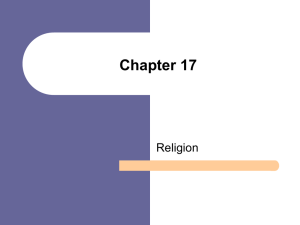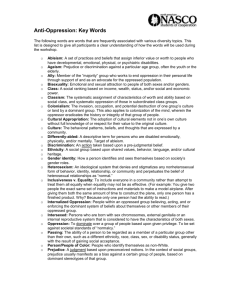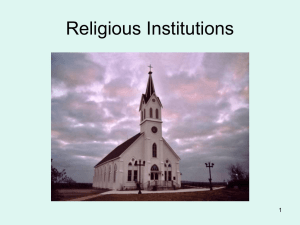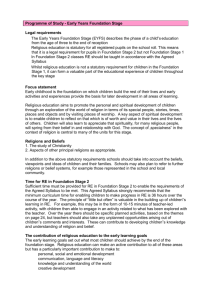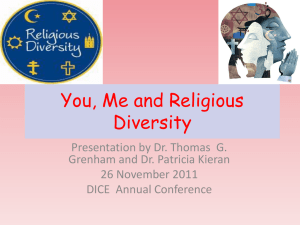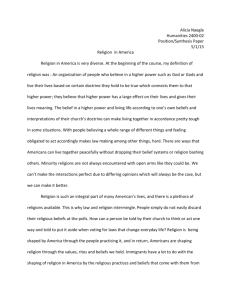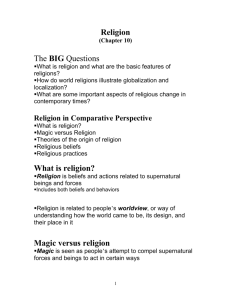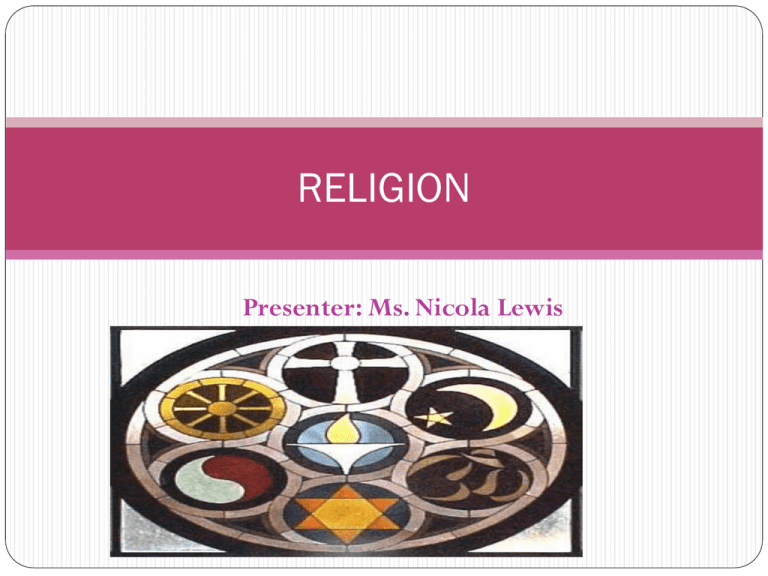
RELIGION
Presenter: Ms. Nicola Lewis
What is Religion?
Religion refers to the existence of a supernatural being
which has a governing effect on life. ( Robertson, 1970)
“A set of symbols evoking feelings of reverence; and is
linked to rituals or ceremonies in which a community of
believers practice” (Durkheim, 1970)
The social Institution of Religion
The most common idea and belief across most religions is that
there are sacred elements for example, Gods, symbols, scriptures,
artefacts which govern the lives of individuals.
Religion is viewed as things that are profane which speaks to the
ordinary.
Religious beliefs generally prescribe ideal behaviours and there is
usually some form of collective worship involving rituals and
ceremonies, all of which are believed to impact in some way on the
afterlife.
Religion as an institution has to compete with secular beliefs and
values. For example, in the theocracy(religious doctrine) like Iran
education is based on the principles of the koran whilst in a secular
state education could be based on values that promote democracy,
cooperation and empathy. These may be similar to what religious
school teach, but in secular state schools they are not attributed to
the beliefs and practices of any particular religion
Historical Context of Religion
The ideas and beliefs of the dominant class is prominent in the
institution of religion but there are less dominant ideas in alternative
and religious minority groups. This has its genesis in European
colonization and still continues in our society today.
This social institution was recreated by the Amerindians and Africans
through the processes of hybridization and syncreticism which still
continues in present day society.
Caribbean people did accept European religion and those which came
later such as the Protestant and Nonconformist to create different
varieties within Christianity.
Each Caribbean territory has different ideas and beliefs about religion.
For example, in countries where the Spanish and French dominated
Roman Catholicism is most dominant.These countries include the
Hispanic Caribbean,Trinidad, Grenada, St. Lucia, St.Vincent,
Martinique, Guadeloupe, Dominica and Belize.
Religion is influenced by the stratified nature of the society.
The upper class ( Europeans, coloureds and some blacks)
attended mainstream European churches.
Some had dual membership that means they would attended
some of the European churches but simultaneously practice
their Afro- Christian religions such as pocomania, kumina.
The aftermath of emancipation saw the full flowering of
syncretic religions in the Caribbean such as Myal, Revivalism,
Pocomania, Santeria and distinctive African forms- Shango
and Vodun
The grassroot religions faced colonial oppression because
they were thought to be loud, bellringing and a force to resist
white supremacy. Thus, the colonial authorities passed laws
forbidding the Spiritual Baptist to practice their rituals.This
was done in Trinidad and St. Vincent where persons were
imprisoned.
Despite the oppression faced Africans never stopped
chanting, singing, drumming to escape the evils of
colonialism. This was later punctuated in the Rastafarian and
Marcus Garvey movements which opposed white supremacy
in the caribbean.
There were other minority groups such as the Hindus and
Muslims who came in the later part of the 19th century who
developed their own religious groups and schools. For
example, in Trinidad the Hindus belonged to different
organizational sects such as Sanatan Dharma, the Arya
Samaj the Kabir Panth associations all of whom own schools
today.
The Muslims who were small in comparison to the Hindus also
had their own religious sects such as the Trinidad Muslim
League (TML);the Tackveeact ul Islamic Association (TIA);
Anjuman Sunnat-ul-Jamaat (ASJA) and Jamaat- alMuslimeen ( A radical black muslin group)
Impact of Religion on Caribbean
Society and Culture
Gives sacred authority to society’s rules and values which helps to
maintain social stability- codes of conduct which brings about
cooperation and cohesion among members.
Religion helps to preserve cultural heritage in the face of
globalization. For example, the Garifuna of Belize continue some
of their West African traditions such as Dugu ceremony or feasting
of the dead where they commune with ancestral spirits.
Legitimates the power and material advantage employed by the
dominant groups/rulers of society.
What we conceptualize as right or wrong is shaped to a large
extent by religious beliefs. For example, in an Islamic society
capital punishment may be relevant for more than just unlawful
killing. Jehovah’s witnesses refuse blood transfusion even when it
may save life.
Impact of Religion Cont’d
Commands major influence in society as it affects non
religious institutions such as the family and is instrumental in
bringing about social changes.
Influences morality- values (pre-marital sex)
Influences work ethic- honesty, punctuality, productivity;
promotes humanitarian and welfare services to society.
Governs perceptions on health.
Religion can also be seen as a source of oppression for
women. For example, women of Roman Catholic faith
playing a conservative role where religious laws affect her
reproductive health in not being able to do an abortion or use
birth control. Koranic laws influence dress and behaviour of
women.
Religion governs the way of life of individuals in society. For
example, fashion recreation and diet.
Religion is an opium to escape pain and suffering and find
peace with a supernatural being.
It provides direction and focus for life’s journey.
Religion does not always promote social solidarity but can
cause conflict between different religious groups.
Sociological Perspectives on Religion
Functionalist
Religion functions to preserve social order and social
cohesion.
Talcott Parsons argues that provides guidelines for
behaviour. In this way religion helps to provide society
with the consensus which is pivotal for social stability.
Religious beliefs gives meaning to life; they answer man’s
questions and the world in which he lives.
Marxist Perspectives on Religion
Marx sees religion as an illusion that eases the pain produced
by exploitation and oppression. Religion facilitates ruling
class ideology by justifying and legitimizing the subordination
of the subject class, and the domination and privilege of the
ruling class.
The ideology of religion serves to distract people from a true
perception of their social environment. Exploitation is seen
as tests by God which if passed on earth will result in great
rewards in heaven. Poverty is seen as a virtue or God’s will,
thus lower classes never truly understands that they are being
oppressed by the upper class and that they should do
something about it.
Interpretivist Perspectives on Religion
Emphasis is on how an individual or a group constructs their
idea of God and their relationship with God and/ or church,
how they choose what they believe and what not to believe,
how they relate the other religions and how belief and nonbelief affects their daily lives and actions.

